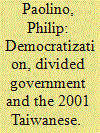| Srl | Item |
| 1 |
ID:
062549


|
|
|
|
|
| Publication |
Feb-Apr 2005.
|
|
|
|
|
|
|
|
|
|
|
|
|
|
|
|
| 2 |
ID:
155191


|
|
|
|
|
| Summary/Abstract |
The academic debate concerning public opinion about war focuses upon two explanations: cost/benefits and partisan cues. Both sides of this debate use laboratory experiments to estimate the influence of events and cues, but Gelpi is notable for using a well-designed experiment to compare the theories simultaneously. He argues that his results support the cost/benefits explanation as “surprising events” that counter individuals’ prior attitudes have significantly more effect than “surprising opinions” upon people’s attitudes toward the Iraq War. His analysis, however, considers only the direction, but not the strength, of people’s attitudes toward the war. Additionally, the measure of source credibility for determining the influence of cues is not optimal. When the analysis accounts for attitude strength and uses a better measure of source credibility, the results show little support for the effect of surprising events and markedly greater support for the influence of partisan cues.
|
|
|
|
|
|
|
|
|
|
|
|
|
|
|
|
| 3 |
ID:
182593


|
|
|
|
|
| Summary/Abstract |
We present a theory on how trust in the central government to remedy grievances combined with a lack of trust in local government to act motivates people to participate in local protests in China. Low trust in local government combined with high trust in the central government gives people expectation that protest will not be an exercise in futility. People protest to redress injustices when they believe that such protests have a chance of producing a favorable resolution of their grievances. Utilizing individual level data from the Asian Barometer Survey Wave 4, our analysis suggests that, in contemporary China, people who have greater trust in the central government than the local government are more likely than others to report having participated in protests. In a society without meaningful elections, participating in protest is an effective strategy for attracting the attention from the upper-level authorities in hope of redressing unfavorable situations.
|
|
|
|
|
|
|
|
|
|
|
|
|
|
|
|